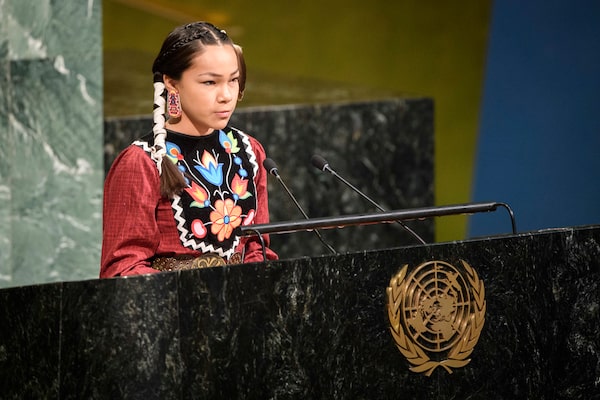
Autumn Peltier, 13, who is from Wiikwemkoong First Nation on Manitoulin Island in Northern Ontario, speaks in the General Assembly for the launch of the International Decade for Action on Water for Sustainable Development, March 22, 2018, at U.N. headquarters.UN Photo/Manuel Elias/The Associated Press
There are things about Canada that Autumn Peltier can’t accept. Children growing up without access to drinkable tap water. Seventy-year-olds having to walk every day to claim water rations. Entire communities unable to shower without risking possible exposure to a carcinogen.
These are stories she hears from across the country. At 15, Autumn, the Anishinabek Nation chief water commissioner, has spent nearly half her life fighting against these injustices.
“There are people living in third-world conditions in our first-world country,” she says. “It’s insane. Canada is wealthy. There shouldn’t be places that can’t drink their water.”
Federal election 2019: Where the four main parties stand on climate policy
Facing the risk: Climate impacts that young Canadians will have to contend with
Opinion: I’m a Montreal teen – and this is why I’m marching for the climate
There are 56 First Nations communities across Canada under long-term boil-water advisories, the longest of which have lasted nearly 25 years. Worse, some types of contaminations are resistant to being boiled. Others don’t even need to be consumed to be toxic, such as trihalomethanes (THMs), which recently forced Northern Ontario First Nations community Attawapiskat to declare a state of emergency. THMs are linked to an elevated risk of cancer. They can be absorbed through the skin, making showering and even washing your hands a danger.
Autumn travelled to New York this week to speak at the Indigenous march within Friday’s climate strike. She will also deliver a speech at the Global Landscapes Forum at the United Nations on Saturday. This will be her second speech at the UN in as many years.
“I’m here to tell people about the importance of water, and to educate people on a cultural and spiritual level,” Autumn said. “They need to know that we need to act now.”
As she turns 15 on Friday, the same day students across Canada are expected to march in a massive strike intended to disrupt climate-change inaction, Autumn finds herself at the forefront of an environmental movement being led by youth like her and Swedish climate activist Greta Thunberg.
“I do get a different perspective than some of the other activists, since most of my work comes from traditional [Indigenous] cultural knowledge,” she says. “But the others give me courage. Some of those kids are really strong, and they have strong messages as well. It makes me feel like we will be able to get something done.”
Autumn, who is from Wiikwemkoong First Nation on Manitoulin Island in Northern Ontario, took over the role of chief water commissioner from her great-aunt, Josephine Mandamin, another water activist who Autumn says heavily inspired her. Autumn is about 50 years younger than Ms. Mandamin was when she took the title. She has recently been nominated for the 2019 International Children’s Peace Prize by the David Suzuki Foundation for her environmentalism.
“It’s kind of stressful, because it’s a big role,” Autumn said. “I have to look after and make decisions for the Great Lakes. Any decision made about the Great Lakes I have to be there for and participate in.”
When Autumn isn’t presiding over major environmental decisions or speaking to world leaders, she’s in high school, a dichotomy she admits is “weird.” Her peers help bridge the gap.
“My friends are very supportive of what I do,” she said. “They think it’s really cool.”
Previously, Autumn aspired to one day be elected prime minister. Now she says she wants to become a pediatric nurse to help people like her younger sister, who suffers from epilepsy. Autumn says regardless of her career, she never plans on abandoning her commitment to environmental activism and being a “water warrior.”
With reports from The Canadian Press
Our Morning Update and Evening Update newsletters are written by Globe editors, giving you a concise summary of the day’s most important headlines. Sign up today.